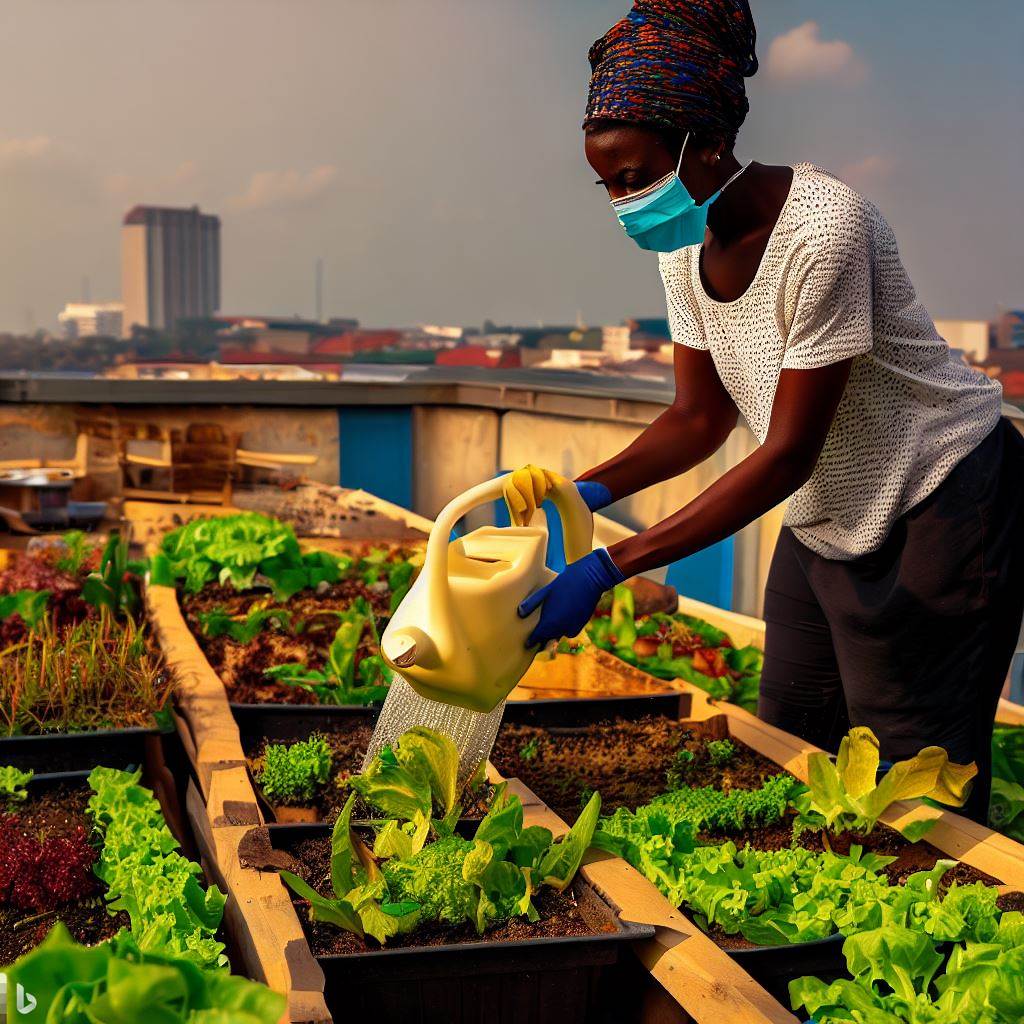Introduction
A. Rural and Urban Farming: Vital Differences
- Rural farming in villages.
- Urban farming in cities.
- Differ in scale, techniques, and goals.
B. Purpose of this Blog Post
- Explore rural and urban farming disparities.
- Highlight pros and cons of both approaches.
- Shed light on their impacts in Nigeria.
C. Nigerian Perspective on Farming
- Agriculture is central to Nigeria’s economy.
- Majority practice rural farming.
- Urban farming rising due to urbanization.
- Challenges: land scarcity, tech adoption.
In this blog post, we delve into the distinct realms of rural and urban farming from a Nigerian standpoint.
We aim to dissect the core disparities between these farming approaches, outlining their strengths and weaknesses.
As we navigate through this exploration, the intricate relationship of Nigeria with agriculture becomes apparent, where the majority engages in rural farming while urban farming gains momentum due to rapid urbanization
Stay with us to unravel the intricate threads of farming in Nigeria, understanding its nuances and implications.
Importance of Farming in Nigeria
A. Agriculture’s contribution to Nigeria’s economy
- Agriculture plays a vital role in Nigeria’s economy, contributing significantly to its gross domestic product (GDP).
- The agricultural sector provides employment opportunities for a large portion of the population, especially in rural areas.
- The sector serves as a source of foreign exchange earnings through the exportation of agricultural products.
- A strong agricultural sector stimulates the growth of other sectors, such as manufacturing and transportation, boosting overall economic development.
- Agriculture contributes to poverty reduction by providing income for smallholder farmers and improving livelihoods.
B. Employment opportunities in the agricultural sector
- Farming in Nigeria offers diverse job opportunities, including farming itself, processing, marketing, and distribution of agricultural products.
- The sector employs a significant percentage of the Nigerian population, especially in rural communities where farming is the predominant occupation.
- Farming provides employment not only for farmers but also for agricultural engineers, researchers, extension workers, and other related professionals.
- Increased investment in the agricultural sector can create additional employment opportunities across the value chain, thus reducing unemployment rates.
C. Food security and self-sufficiency
- Nigeria has a rapidly growing population, and ensuring food security is crucial to meet the nutritional needs of its citizens.
- Investing in farming and increasing agricultural productivity is necessary to guarantee food availability and accessibility.
- Rural farming plays a vital role in providing food for both urban and rural populations, reducing the dependence on imported food items.
- Promoting sustainable farming practices, such as organic farming and crop diversification, enhances food security and reduces the reliance on external sources
- Achieving self-sufficiency in food production helps to stabilize food prices, improve nutrition, and ensure a stable economy.
Farming in Nigeria holds great importance for the country’s economy, employment opportunities, and food security.
The agricultural sector contributes significantly to Nigeria’s GDP, provides employment for a large portion of the population, and generates foreign exchange earnings.
Additionally, investing in farming and improving agricultural productivity is crucial for ensuring food security and reducing the nation’s dependence on imported food items.
Therefore, it is crucial for the Nigerian government, private sector, and individuals to recognize the significance of farming and take collective actions to support its growth and development.
Read: Navigating Agronomy Sales Legislation in Nigeria
Rural Farming in Nigeria
Definition and characteristics of rural farming
Rural farming in Nigeria refers to agricultural practices that take place in rural areas, typically outside of urban centers.
It is characterized by small-scale farming operations, traditional farming techniques, and a focus on subsistence farming rather than commercial production.
Advantages of rural farming
Abundance of fertile land
Rural areas in Nigeria have a significant amount of fertile land available for farming. This allows farmers to cultivate crops and raise livestock with ease, resulting in higher yields and productivity.
Lower cost of land and production
Compared to urban areas, the cost of land in rural areas is significantly lower.
This allows farmers to acquire larger plots of land at more affordable prices, reducing their overall production costs and increasing their profit margins.
Potential for organic farming practices
Rural farming provides a conducive environment for organic farming practices.
Transform Your Career in Nigeria
Discover unmatched expertise with our personalized Career Consulting service. Navigate Nigeria’s job market with a strategy tailored just for you.
Get StartedDue to the absence of industrial pollution and the availability of natural resources, farmers can adopt organic methods and produce high-quality, chemical-free agricultural products.
Challenges faced in rural farming
Limited access to modern technology and infrastructure
Rural farmers in Nigeria often lack access to modern farming technologies and infrastructure.
This hinders their ability to increase productivity, improve efficiency, and compete with larger, more technologically advanced farms.
Lack of government support and funding
Government support and funding for rural farming in Nigeria is limited.
This restricts farmers’ access to financial resources, training programs, and essential agricultural inputs, hindering their ability to modernize and expand their operations.
Young population preferring urban lifestyle
The younger population in Nigeria tends to prefer an urban lifestyle over rural farming.
This demographic shift results in a labor shortage in rural areas, making it difficult to attract and retain young and skilled workers in the agriculture sector.
Rural farming in Nigeria is characterized by small-scale operations that prioritize subsistence farming.
Despite the challenges faced, this type of farming offers several advantages, including access to fertile land, lower production costs, and the potential for organic practices.
However, limited access to modern technology and infrastructure, lack of government support and funding, and the trend of the young population preferring urban lifestyles pose significant challenges for the sustainability and development of rural farming in Nigeria.
Read: Salary Expectations for Agronomy Sales Managers

Urban Farming in Nigeria
Definition and characteristics of urban farming
Urban farming refers to the practice of growing and cultivating crops and rearing animals within urban areas. It involves the use of limited space, innovative practices, and integration with modern technology.
Advantages of urban farming
Efficient use of limited space
Urban farming enables individuals to maximize land usage in densely populated cities, where land availability is scarce.
By utilizing rooftops, balconies, and small plots of land, urban farmers can grow a variety of crops without the need for large acreages.
Integration with modern technology and innovative practices
Urban farmers have the advantage of incorporating modern technology into their farming practices. This includes the use of hydroponics, vertical farming systems, and automated irrigation systems.
These technologies enhance productivity, optimize resource utilization, and minimize wastage.
Availability of market opportunities
Due to the high population density of urban areas, there is a constant demand for fresh produce. Urban farmers can tap into local markets and sell their products directly to consumers.
This eliminates the need for intermediaries and ensures a higher profit margin.
Challenges faced in urban farming
Limited access to land and high cost of urban space
One of the major challenges in urban farming is the limited availability of land. Urban areas are predominantly built-up, making it difficult for farmers to access large parcels of land.
Additionally, the cost of land in cities is often prohibitively high, limiting the expansion of urban farming projects.
Pollution and environmental concerns
Urban farming faces the issue of pollution due to the proximity of industries, vehicular emissions, and the accumulation of waste.
Contaminants in the soil and air can adversely affect crop growth, posing health risks to both farmers and consumers.
Proper waste management and the use of organic farming practices are crucial to mitigate these concerns.
Lack of awareness and training
Many potential urban farmers lack the necessary knowledge and training to venture into urban farming. This poses a significant barrier to the development and growth of the sector.
Publish Your Professional Profile, Business or Brand
Showcase your expertise, gain trust, and boost visibility instantly on Professions.ng.
Publish NowEducating individuals about the benefits of urban farming and providing technical training can help overcome this challenge.
Urban farming in Nigeria holds significant potential for addressing food security, increasing access to fresh produce, and creating economic opportunities.
It offers efficient land use, integration with modern technology, and access to thriving markets.
However, challenges such as limited land availability, pollution, and lack of knowledge must be addressed to fully harness the benefits of urban farming. With proper planning, support, and investment, urban farming can contribute to a sustainable and resilient food system in Nigeria.
Read: Guide to Crop Diversification for Nigerian Farmers
Comparison between Rural and Urban Farming in Nigeria
Rural farming in Nigeria has its own set of advantages and challenges, as does urban farming. Let’s compare the two.
Productivity and yield comparison
- Rural farming benefits from larger land spaces, allowing for extensive cultivation and higher crop yields.
- Urban farms, on the other hand, utilize limited space efficiently through vertical farming and hydroponics, resulting in higher yield per square meter.
Economic viability and financial sustainability
- Rural farmers often face difficulties in accessing markets due to remote locations, leading to lower profitability and financial stability.
- Urban farmers, due to their proximity to markets and consumers, have better opportunities to sell their produce at higher prices, ensuring economic viability.
Social and environmental impacts
- Rural farming contributes to rural development by providing employment opportunities and income generation for local communities.
- Urban farming promotes community engagement and enhances food security by reducing dependence on external food sources.
- Rural farming utilizes traditional and sustainable farming practices, preserving biodiversity and maintaining the ecological balance.
- Some urban farming methods, such as rooftop gardens and vertical farming, utilize recycled materials and reduce carbon footprint, positively impacting the environment.
Both rural and urban farming have their own strengths and weaknesses in the Nigerian context.
Rural farming offers larger land spaces and promotes rural development, while urban farming maximizes limited space and enhances food security.
Read: How to Excel as an Agronomy Sales Manager
Discover More: Understanding Agronomy Products Sales in Nigeria
Conclusion
A. Summary of the main points discussed
In this blog post, we explored the nuances of Rural vs. Urban Farming in Nigeria.
- Contrasted benefits of each: tradition in rural, innovation in urban.
- Discussed challenges: land scarcity, technology access, market reach.
B. Emphasis on the need for a balanced approach to farming in Nigeria
The significance of a balanced approach to farming can’t be overstated.
- Rural farming preserves traditions.
- Urban farming fuels innovation.
- Synergy could address food security and economic growth.
C. Call to action for government and individuals
We urge the Nigerian government and individuals to take action:
- Government: Invest in rural infrastructure and tech for urban farming.
- Individuals: Embrace both farming forms; support local produce.
- Collaboration can lead to a thriving, sustainable agricultural future for Nigeria.




